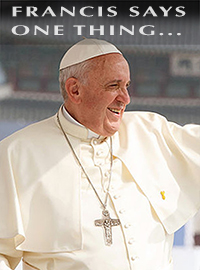| How Climate Alarmists — and Some Skeptics — Misuse and Abuse Pope Francis |
 |
|
By Ben Boychuk
Thursday, June 25 2015 |
Pope Francis’s new encyclical, Laudato Si, was supposed to be all about climate change — wasn’t it? From the moment the Vatican put out word in December that the Holy Father was keenly interested in the question of environmental protection, particularly the United Nations meeting on climate change in Paris later this year, the mainstream media latched onto the idea — more of a hope, really — that the “Cool Pope” would give “climate deniers” a well-deserved and long overdue rebuke. Commentators and editorialists began speculating about Republicans’ “pope problem.” More than a few liberals chuckled that just as conservatives accused Democrats of picking and choosing the Church doctrines they support, surely Republican could be accused of the same by dismissing the pope’s encyclical out of hand. Even before Laudato Si was published officially last week, a veritable constellation of globalists, environmental activists and sundry politicians had an opinion they clamored to share. U.N. Secretary General Ban Ki Moon went so far as to say “religion and science are now united.” Vice President Joe Biden, speaking at a clean energy forum last Tuesday, said of Francis: “We have a good one now.” Former Vice President Al Gore said, “I could become a Catholic because of this Pope.” When the encyclical finally appeared, the New York Times editorial board claimed it was “the first papal encyclical devoted solely to environmental issues” — not quite — and expressed hope that the pope’s words would signal “the beginning of the broad moral awakening necessary to persuade not just one billion Catholic faithful, but humanity at large, of our collective responsibility to pass along a clean and safe planet to future generations. In other words, to do the things that mere facts have not inspired us to do.” It turns out “Laudato Si” is not a climate change document. Nor is it a scientific treatise, a political manifesto or a brief for statism. So what is it, then? It’s a theological appeal, not just to the world’s 1.2 billion Catholics, but also to the entire world, to think about the “environment” in terms of all creation, not simply the narrow view of “nature” that many environmentalists hold. Most of the people praising the pope’s comments on climate change — comments that account for roughly 2 percent of a sprawling, 45,000-word document — seemed to have missed that. Barbara Hendricks, Germany’s environment minister, praised the pope’s “clear language” and “deep thought,” saying his words are “an incentive for everyone to work to protect the environment.” She hoped the encyclical would move people, “especially in conservative circles that try to talk down the devastating effect of climate change.” It’s true that Pope Francis supports many of the supposed scientific claims of climate alarmists, including the view that mankind is responsible for global warming. But he’s careful not to make his assertions too sweeping. He accepts that there may be other causes for climate change, including solar cycles and volcanic activity. Michael Mann, the University of Pennsylvania professor who devised the disputed “hockey stick” graph that purports to show a sharp rise in global temperatures after 1900, actually chided the pope for being too cautious in his approach. “Human activity is most likely responsible not just for ‘most global warming’ but all of it, and then some, because natural factors have been acting slightly in the other direction,” Mann told the New York Times. That same Times story noted, almost ruefully, “the scattered policy prescriptions in the document do not display the meticulous framing of the scientific statements.” Well, no. But come to think of it, most policy prescriptions do not display the meticulous framing of scientific statements because the “science of politics” is so inexact, it’s practically an art. On close inspection, what Francis has to say doesn’t quite jibe with the core tenets of the Church of Global Warming, which are often anti-capitalist, anti-growth and at times even anti-human. The pope doesn’t agree with Gore, for example, that “fertility management” is a viable moral strategy for tackling global warming. Amid the fulsome praise of the pope’s statements about man’s role in polluting the environment, few seemed to have played up the portion where Francis says “concern for the protection of nature is also incompatible with the justification of abortion.” Although his concern for sound ecology couldn’t be clearer (“The Earth, our home, is beginning to look more and more like an immense pile of filth,” he writes on one of the encyclical’s more memorable passages), the pontiff insists that “a return to nature cannot be at the expense of freedom and the responsibility of the human being, that is the part of the world tasked with cultivating its ability to protect and develop their potential.” And he unequivocally rejects the “deification of the earth, which would deprive us of the call to collaborate with it and protect its fragility.” Greenpeace and the Environmental Defense League are not amused. Pope Francis is not an unabashed friend of free markets. Neither was his predecessor, Pope Benedict XVI or his predecessor, Pope St. John Paul II. Most libertarians and conservatives recognize that markets work more efficiently than mandates, and top-down solutions tend to cause more problems than they solve. Where there is state-control of industry, the environment always suffers. But Francis didn’t write an economic thesis, either. With Laudato Si, he’s given the world plenty to think about and discuss — much more than the Bans, Manns and Gores of the world would have you believe. |
Related Articles : |
























